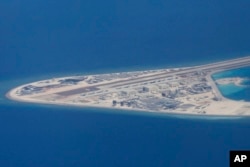China and the Philippines will sustain a friendship of three years despite a risky mishap in a disputed sea because each side values the other for political or economic reasons, analysts believe.
The Philippines is getting investment and other aid from Beijing to pay for $169 billion in infrastructure renewal, while China sees strong ties with the Philippines as a way to stop Manila and more powerful allies such as the United States from trying to stop its maritime expansion.
“The president is very much pro-China,” said Antonio Contreras, political scientist at De La Salle University in the Philippines, referring to Rodrigo Duterte in Manila. “His statements are very much easing China in a way. At the level of relations, I don’t think it will change, especially at the policy level.”
On June 9, a Chinese fishing vessel hit a Filipino boat near the Reed Bank, a feature in the South China Sea’s Spratly Islands, Philippine media reported. Reports say the Chinese vessel left without helping 22 Filipino crew members who were thrown into the water. A Vietnamese boat nearby helped save them.
Soft official language
Although Philippine Defense Secretary Delfin Lorenzana condemned the Chinese vessel for leaving the collision site without offering aid, Duterte's office has taken a softer tone. Duterte sought friendship with China in 2016 after years of open maritime sovereignty spats.
His spokesman Salvador Panelo said Wednesday “the Chinese side has the right to be heard” and urged people with questions to “wait,” according to his statement on the presidential office website.
A day earlier, China “expressed condolences to the Filipino fishermen who were in distress in an inadvertent encounter with a Chinese fishing boat,” the official Xinhua News Agency in Beijing said. China will investigate the incident, Xinhua said.
“Linking it to the friendly feelings of the two peoples or with the relations between the two countries and even politicizing this issue is not appropriate,” Xinhua quoted Chinese foreign ministry spokesman Lu Kang saying.
Friendship despite a dispute
The Philippines and four other governments, all militarily weaker than China, contest parts of Beijing’s claims to about 90 percent of the 3.5 million-square-kilometer sea that includes the Spratly chain. Claimants prize the sea’s fisheries, marine shipping lanes and fossil fuel reserves.
China has worried other claimants by landfilling small islets over the past 10 years for military use. The other competing claimants are Brunei, Malaysia, Taiwan and Vietnam.
After Duterte improved relations, Beijing pledged $24 billion in development aid and investment to the Philippines. Much of that has been committed to specific infrastructure projects. Duterte wants infrastructure -- dilapidated or outdated around much of the archipelago -- to be overhauled before his term ends in 2022 to help stoke investment.
“I think it’s pretty clear that he has every intent to maintain a stable relationship with China,” said Collin Koh, maritime security research fellow at Nanyang Technological University in Singapore. Statements since the incident, he said, “have indicated that China felt a quiet sense of confidence in its stable relationship with the Philippines.”
For China, ties with the Philippines help push back U.S. influence in the South China Sea. The United States has no claim to the sea, which spans from Hong Kong to Borneo, but has more firepower and wants the waterway open to international use instead of Chinese control. An old ally of the Philippines, Washington has helped train Manila’s navy.
Neither China nor the Philippines has backed off its maritime claims, but the two have avoided sustained, publicized disputes during Duterte’s term.
Suspicion among Filipinos
The boat mishap will rekindle opposition among the Armed Forces of the Philippines to Duterte's pro-China policies, analysts said.
“It also shows that while the Philippine government is now trying to respond very diplomatically, there is an underlying debate,” said Maria Ela Atienza, a political science professor at University of the Philippines. “It shows that within the Philippine government, different officials are responding quite differently.”
The Philippine military considers the United States its chief ally. The two sides observe a 68-year-old mutual defense pact and a visiting-forces agreement.
On Saturday a Philippine navy chief vice admiral called the June 9 boat incident “a deliberate maneuver to ram the smaller [Filipino] craft,” news website Philstar.com reported. Duterte asked the navy Monday to keep out of trouble.
Duterte will ultimately find it hard to mute skeptics, said Carl Baker, director of programs with the U.S. think tank CSIS Pacific Forum.
"At this point, it is becoming clear that it will become increasingly difficult to make any major improvement in China-Philippine relations as long as there is this underlying resentment against any hint of inappropriate action by China in the South China Sea," Baker said.





